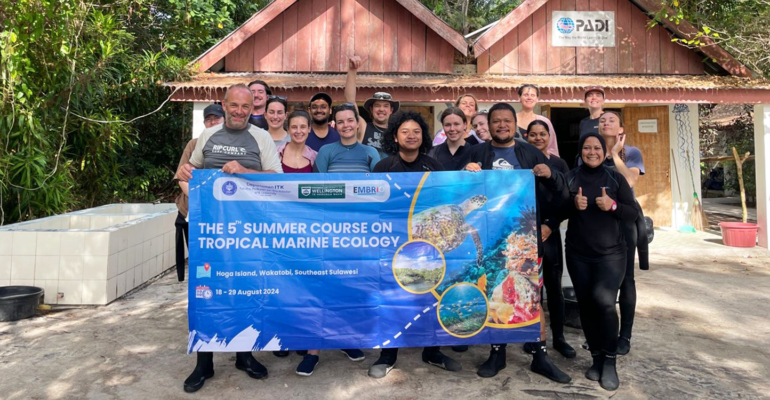Introducing Tropical Marine Diversity, IPB University and Victoria University of Wellington Explore Wakatobi

IPB University in collaboration with Victoria University of Wellington (VUW), New Zealand invited students to explore tropical islands and explore marine diversity in Hoga and Kaledupa Islands, Wakatobi, Southeast Sulawesi through a summer course programme.
The summer course was attended by 13 students from IPB University and VUW who came from several countries such as New Zealand, the United States, Sri Lanka, India, and Indonesia.
Hoga Island is one of the Wakatobi islands located east of Kaledupa Island. The island has an extraordinary diversity of marine life and is located in the heart of the Coral Triangle Centre and is the first island of Operation Wallacea’s marine site.
The island is also a learning station for marine diversity, especially the world’s coral reefs. Previously, three summer courses between IPB University and VUW have been conducted at this location.
Dr Beginer Subhan, Secretary of the Department of Marine Science and Technology (ITK), Faculty of Fisheries and Marine Science (FPIK) IPB University explained that this summer course is a programme that needs to be maintained. “This is the 5th summer course and the 4th with New Zealand. This cooperation has been established since 2015 and is very supportive for the achievement of inbound foreign students to Indonesia.”
The summer course activities include field lectures on coral reef diversity, reef fish, seagrass, mangroves, and benthic habitats. Students learn first-hand about reef and reef fish identification methods, density calculations, and data analysis. Students in pairs or known as buddy system snorkelled in several dive spots.
The most interesting thing for students is the seagrass night safari activity which is a biodiversity exploration at night. Students equipped with booties, flashlights and bathing cups (dipper) walked from the beach to the middle of the receding sea. Under the light of the full moon, they witnessed the beauty and uniqueness of marine life trapped in water basins in seagrass ecosystems.
“Wow, this is really cool, this is my first time seeing octopus and sea snakes in the wild,” said one of the summer course participants. During the safari night, they could also see lionfish, flatworms, moray eels, sea cucumbers, sea urchins and others. Seagrass is one of the most important habitats in coastal areas because it serves as a nursery, spawning and feeding ground for marine life.
Participants were also excited to find canary crabs or coconut crabs (Birgus latro), which are the largest land arthropods in the world. This crab is known for its ability to peel coconuts with its hard claws. The coconut crab is protected by Minister of Forestry decree No.12/KPTS-II/Um/1987, and is categorised as a rare and endangered species according to the International Union for Conservation of the Nature (IUCN) Red List.
Students also visited the Bajo Sampela tribe village in the waters around Kaledupa. This attracted a lot of enthusiasm from students who were very curious about the Bajo tribe’s unique way of life, who can dive for up to 13 minutes in the water without breathing apparatus. The summer course is highly organised thanks to the collaboration with Operation Wallacea, based on Hoga Island.
“We will do this summer course regularly every two years, we will try to explore Raja Ampat as the next destination for the summer course,” said Prof James Bell, a collaborator from VUW.
Having stopped during the pandemic, the hope is that this summer course activity can strengthen academic and research cooperation in the marine field, especially between IPB University and Victoria University of Wellington.
“Summer course activities are very supportive of increasing inbound and the Main Performance Indicators (IKU) of the ITK Department. In addition, this activity builds an atmosphere of international cooperation both between students and lecturers in our department,’ said Dr Syamsul Bahri Agus, Chairman of the Department of ITK IPB University. (*/Rz)”(IAAS/RUM)



